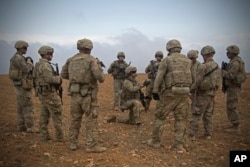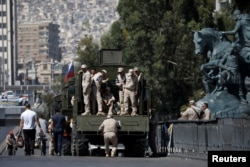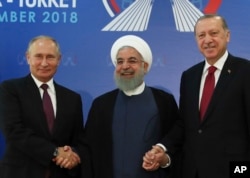Russian President Vladimir Putin expressed support for a surprise White House decision to pull 2,000 U.S. troops out of Syria, calling their presence there illegitimate and an impediment to peace in the region.
Addressing a record 1,700 journalists at his 14th annual end-of-year marathon press conference Thursday, Putin said he agreed with President Donald Trump’s assessment that Islamic State had largely been defeated on the ground in Syria.
“Donald is right, I agree with him [about that],” he said, stating that radical militants still holding small parts of northern Syria had suffered at least a “serious blow” over the past year.
“I don’t think the [U.S. forces] are needed there,” Putin said. “And let’s not forget that the presence of [U.S.] troops there is illegitimate. The U.S. is there without backing from the United Nations or an invitation from the Syrian government. Russia is there at the invitation of the Syrian government. But if the U.S. has decided to withdraw, that’s good.”
The U.S. has justified its military presence in Syria to combat the Islamic State as part of its global war on terrorism.
Putin then expressed skepticism about whether the U.S. withdrawal from Syria will actually happen.
“We don’t yet see any signs yet of the withdrawal of U.S. troops,” he said. “And how long has the U.S. been in Afghanistan? 17 years? And almost every year they say they’re pulling out their troops.”
On Wednesday, Russian state media outlets reported that Russia’s Foreign Ministry called a prospective U.S. withdrawal auspicious for a political settlement of the 7-year-old crisis.
The ministry also said an initiative to form a Syrian constitutional committee had better prospects for success without a U.S. presence in the region.
Fueling Trump’s critics
The Kremlin’s reception of Wednesday’s White House announcement provided rhetorical ammunition to U.S. critics of Trump’s decision, which even a few of Trump’s congressional allies called chaotic and misguided.
Senate Armed Services Committee member Lindsey Graham of South Carolina commented on the announcement on Twitter.
“I found someone who is supportive of the decision to retreat from #Syria,” tweeted Florida Republican Sen. Marco Rubio in a post that linked to a Russian embassy statement of support for Trump’s decision.
Some Moscow-based military experts, however, aren’t so sure that a U.S. military withdrawal immediately benefits Russia.
“I think Putin must be satisfied, and maybe — maybe, but I wouldn’t insist — in the future, he will commend this event as a victory for Russia, perhaps,” said Alexey Malashenko of the Moscow-based Dialogue of Civilizations Research Institute.
But, he added, “if indeed American troops leave from Syria, [Russia] will have to present more explanation for its presence there.”
No US to demonize
For years, Malashenko said, Kremlin officials have taken to Russia’s tightly controlled domestic news media platforms to demonize American military aggression in the region, describing it as a necessary justification for Russia’s own military presence.
“For Putin, I believe, the American existence on Syrian territory was somehow comfortable or maybe convenient, but now he must replace or change his explanation for Russia’s role there,” he said.
“I can’t be sure, because I’m not a close observer of Trump, but I believe that some part of the American military will stay. We know this from the recent examples in Afghanistan, in Iraq, and so on,” Malashenko added.
When asked if a U.S. military withdrawal from Syria would pose a significant domestic political victory for Putin, whose approval ratings are at a historic low, he was skeptical.
“That it would appear Putin has decisively defeated U.S. interests in Syria? I doubt it,” he told VOA. “Indeed, if Putin considers a U.S. withdrawal his personal victory or a Russian success, he could have explained that even today at his press conference. But I think that Putin is not sure whether he considers it a victory.”
Fewer players
Andrey Kortunov, director of the Russian International Affairs Council, said reduced prospects for inadvertent clashes between U.S. and Russian troops is by itself a reason for Putin to sleep better, and that U.S. withdrawal is an overall net gain for the Kremlin.
“Putin can be satisfied because the fewer players there are, the easier it is to cut deals … and, in terms of the Kurds, Russia might be in a position to restore that relationship, which broke when Putin opted to forge an alliance with Erdogan,” he said, referring to the president of Turkey.
“These are modest but clear and positive developments for Putin, but there are potentially negative implications,” he added. “For example, what if Trump cuts a deal with Turkey and is committed to bringing Erdogan back to his side? If we Russians have some kind of complications with Ankara, that will jeopardize the whole strategy that Moscow pursues in Syria.”
U.S. troops in Syria have been working closely with an alliance of Kurdish and Arab militias known as the Syrian Democratic Forces (SDF), which Turkey believes is tied to Kurdish militants within its own borders and has threatened to attack.
US arms sales
Paul McLeary of Arlington-based Breaking Defense, who has covered the Syrian war and reported extensively on U.S. arms sales in the region, reported Thursday that Trump and Erdogan had spoken by phone a week earlier, prompting “speculation that the Turkish leader, who’s been edging away from the U.S. and closer to the Kremlin, pushed Trump to withdraw.”
The White House denied that Erdogan influenced Trump’s decision to withdraw, and SDF fighters issued a statement rejecting White House claims that the Islamic State has been defeated.
“Eyebrows were already raised Tuesday evening, however, when the State Department announced the U.S. is prepared to sell over 100 Patriot air defense missiles and radar systems to Turkey for $3.5 billion,” wrote McLeary, who reported that the deal, if approved by Congress, could scuttle Turkish plans to acquire a Russian-made air defense system, a move U.S. and NATO officials have criticized.
Unforeseen consequences
Kortunov of the Russian International Affairs Council, said the U.S. withdrawal could also have unforeseen geopolitical consequences for U.S.-Russian relations.
“Syria was one potential place for U.S.-Russia cooperation, something that they could discuss, or, given a summit meeting, that they could present as a common victory — something that was much easier to agree upon than, for example, Ukraine,” he said. “And now, if the United States is losing interest in Syria, I’m not sure that this is really that good. If I were to advise Putin, I would say we are probably better off with Americans in than with Americans out.”
Asked if the American presence in Syria is required to justify Putin’s rationale for keeping forces on the ground there, Kortunov balked.
“That’s a bit far-fetched in my opinion,” he said. “I don’t think Putin really needs these justifications.
“That’s a much better question to consider for the Iranians,” he said. “Tehran has been very explicit in that they said they would get out of Syria once the Americans are out. So now if the Americans are really out, then Iran has to find another plausible reason to stay there.”
Military analysts say up to 30,000 IS militants remain active in Iraq and Syria and that Trump’s decision appears to have been made without the support or knowledge of top Pentagon officials.







